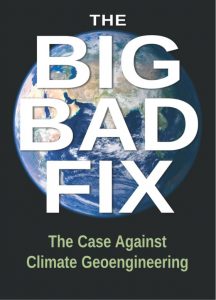Heute lancieren wir unsere großen Geoengineering-Report: The Big Bad Fix – the case against geoengineering, den wir als Heinrich-Böll-Stiftung gemeinsam mit ETC Group und Biofuelwatch herausgeben.
 Und er macht hoffentlich klar: Bei diesem Thema geht es um weit mehr als um Klimapolitik, nämlich um die großmaßstäbliche Manipulation von Klima- und Erdsystemen. The Big Bad Fix warnt vor dem Trend, dass Geoengineering zunehmend als realistische Option im Rahmen radikaler Klimaschutzmaßnahmen diskutiert und so auch immer mehr öffentliche Akzeptanz erfährt. Die Treiber hinter der ‚Normalisierung‘ dieser Debatte werden ebenso beleuchtet wie die vorgeschlagenen Technologien selber. Außerdem beschreibt die ausführliche Analyse die Gefahren einer Militarisierung und potentiellen Nutzung von Geoengineering für militärische Zwecke.
Und er macht hoffentlich klar: Bei diesem Thema geht es um weit mehr als um Klimapolitik, nämlich um die großmaßstäbliche Manipulation von Klima- und Erdsystemen. The Big Bad Fix warnt vor dem Trend, dass Geoengineering zunehmend als realistische Option im Rahmen radikaler Klimaschutzmaßnahmen diskutiert und so auch immer mehr öffentliche Akzeptanz erfährt. Die Treiber hinter der ‚Normalisierung‘ dieser Debatte werden ebenso beleuchtet wie die vorgeschlagenen Technologien selber. Außerdem beschreibt die ausführliche Analyse die Gefahren einer Militarisierung und potentiellen Nutzung von Geoengineering für militärische Zwecke.
Das macht The Big Bad Fix zu einem Must Read für alle Klimaaktiven, Friedensbewegten, Transformationsakteur/innen und kritischen Wissenschaftler/innen. Er soll sowohl Einführung als auch Nachschlagewerk zum Thema sein und ergänzt damit als umfassender und aktueller Bericht andere kritische Informationsquellen und Materialien, so z.B.
GeoengineeringMonitor.org – eine kritische zivilgesellschaftliche Plattform zum Thema, die aktuelle Analysen, Hintergrundinformationen und einen regelmäßigen Newsletter bietet
Die interaktive Weltkarte zu Geoengineering Experimenten und Projekten
Das Dossier der Heinrich-Böll-Stiftung zum Thema Geoengineering
Und für eine grundsätzliche Kritik an technologischen Lösungen von sozial-ökologischen und politischen Problemen empfehle ich Efficiency and Madness – Using Data and Technology to Solve Social, Environmental and Political Problems, einen Essay, der in Zusammenarbeit mit dem Tactical Technology Collective entstanden ist.
Wir lancieren The Big Bad Fix am Rande der UNEA3 in Nairobi, dem höchsten umweltpolitischen Entscheidungsgremium der UN, und im Vorfeld der technischen Zwischenverhandlungen der UN-Biodiversitätskonvention CBD in Montreal. Denn die CBD ist eines der ganz wenigen internationalen Gremien, das sich explizit mit der Regulierung riskanten Zukunftstechnologien befasst. Darunter zählt z.B. die Synthetische Biologie (darunter auch die Gene Drive Technologie), aber auch das Thema Geoengineering. So hat die CBD bereits 2010 ein de-facto Moratorium auf alle Geoengineering-Technologien beschlossen und diese Entscheidung immer wieder (und zuletzt 2016) bekräftigt.
Hier ein paar Hinweise darauf, wie wichtige Akteur/innen aus der Zivilgesellschaft The Big Bad Fix einordnen:
“Geoengineering is a dangerous and risky distraction from real solutions to the climate crisis. We need a complete transformation of our energy systems, food systems and economic systems. But powerful vested economic interests are desperate to divert our attention from system change, and from radical emissions reductions needed at the source. Friends of the Earth International rejects large-scale geoengineering as an unproven technology which could lead to land or resource grabbing and dispossession of local communities. This report is important reading for all of us concerned about the impacts of geoengineering and what can be done about it.”
Karin Nansen, REDES-AT Uruguay, Chair of Friends of the Earth International
“It is unacceptable that while nations suffer the brutal impacts of climate change, profitdriven corporations plan to colonize the sky through geoengineering and lock in climate inaction. The world must be weaned from fossil fuels, cut emissions at the source and not permit any manipulation of the climate that has the potential to pile more harm on Africa and other territories. This report is excellent to understand the real aims of geoengineering and should be required reading for all climate justice activists.”
Nnimmo Bassey, HOME Foundation, Nigeria
“As Indigenous Peoples, we are unified in our opposition to all forms of geoengineering. As human beings, we are entirely dependent upon our respectful relationship with the natural world. We are now faced with the consequences of the exploitation of the natural world that threaten the future existence of all life on Mother Earth. Our Indigenous traditional teachings, lifestyles, spirituality, cultures and leadership of our people has sustained us for millennia and will do so for countless future generations but only if the world adheres to the Natural Laws of Creation and the Precautionary Principle. Geoengineering acts against all of those.”
Tom BK Goldtooth, Indigenous Environmental Network, USA
Inhaltlich fordert The Big Bad Fix ein radikales Umdenken. Was wir brauchen:
A radical realism: What is urgently needed is to challenge the root causes of climate change and infuse an alternative approach with a radical realism. The causes of climate change are widely known and the primary cause is a carbon-oil-addicted civilization with its industrial systems of mass production and mass consumption. A phase-out of existing fossil fuel infrastructure for coal, oil and gas exploitation must get underway immediately if we are serious about confronting climate change and protecting the future for our children and grandchildren. One of the most promising radical alternatives is in fact, not an an “alternative,” but a reality hidden in plain sight: the peasant food web – made up of peasants, pastoralists, urban gardeners, fisherwomen and fishermen – which is able to feed 70% of the world’s population with less than 25% of the land, water and resources. Their work cools the Earth at the same time. The industrial food system uses more than 80% of the land, fuel and resources, and is the largest emitter of greenhouse gases on the planet.
Resist the normalization of geoengineering: Rejection and dismissal are the overwhelming responses of most peoples and governments when they are given basic information about the mechanisms of geoengineering. Geoengineering’s risks – too many and too high – render it unacceptable. Nonetheless, through the usual channels – media, the academy, powerful governments with the luxury, means and hubris to throw their weight around – geoengineering is undergoing “normalization,” where it has become a climate-change response option instead of what it is: a lurid set of proposals, which, if realized, could devastate ecosystems and communities. Even if the deep transformations required from our economies and societies to allow for a climate-just 1.5°C world represent a major political challenge, geoengineering does not constitute a viable alternative. There are political, social, cultural, economic, ethical, moral, intergenerational, rights-based (the rights of women, workers, indigenous peoples, peasants) reasons to oppose it, and that make it a false solution. Geoengineering distracts policymakers from the urgency to support viable alternatives.
Maintain and reinforce the moratoria: The decisions at the Convention on Biological Diversity that established a de facto moratorium on geoengineering, as well as the London Convention/London Protocol’s decision to ban ocean fertilization and marine geoengineering, are crucial and must be maintained and reinforced. It will depend on responsible governments and civil society to continue defending and advancing these decisions, and urging other national governments to honor them. Both landmark decisions signaled the need for a strict, precautionary approach to geoengineering. Any policymaking forum or private sector discussion of geoengineering must be guided by the CBD moratorium, a decision taken by consensus of 193 governments. Discussions that try to advance geoengineering outside this framework are an explicit or implicit undermining of the notion that we need to have informed, multilateral, democratic and transparent governance frameworks for geoengineering technologies – including the possibility of a ban on some or all them. Certainly, other UN bodies, principally the General Assembly, should discuss the broad implications of geoengineering and could consider a ban or other measures to pre-empt action that could bring about greater climate inequities and/or negative environmental and health impacts.
Stop open-air experiments: Geoengineering “experiments” are an oxymoron. To have a significant impact on the global climate, they would need to be so large and sustained over such a prolonged period of time that they could no longer be called experiments. Experiment and deployment would be indistinguishable, and the impacts and side effects could not be recalled. “Small scale,” open-air experiments will not provide useful knowledge about the effects of deployment on climate, but may be useful to test hardware and to establish a “proof of principle” that could encourage governments to invest in a particular technology without a necessary and full prior societal debate, and in the absence of an essential, internationally agreed framework for governance. Furthermore, any experiment that is not done “for scientific purposes” and “in a controlled setting,” among other conditions, violates the CBD moratorium. All open-air SRM experiments, for example, are by definition not carried out in controlled settings and pose a risk of affecting other territories. Outdoor experiments (like SCoPEx) cross a political red line, and should not be allowed to move ahead.
Work for a ban: There are many arguments for banning un-proven, un-testable geoengineering technologies, but the risk of weaponization – with the potential to bring greater disruption to the global climate – is of great concern, and the possibility cannot be ignored by the United Nations. Geoengineering’s inherently dual-use nature – like weather modification before it – should be enough for the UN to consider adopting a ban on all or some geoengineering technologies.
